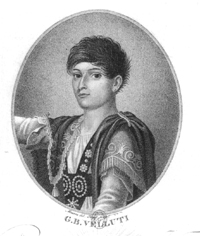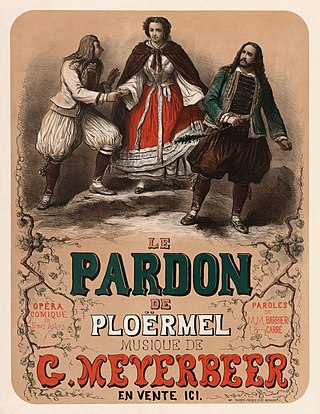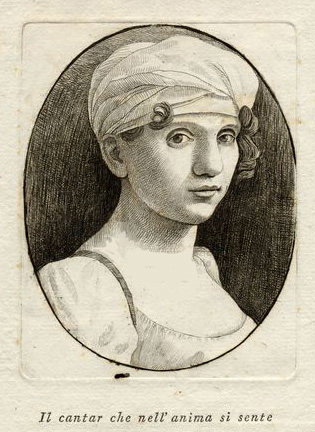
Gioachino Antonio Rossini was an Italian composer who gained fame for his 39 operas, although he also wrote many songs, some chamber music and piano pieces and some sacred music. He set new standards for both comic and serious opera before retiring from large-scale composition while still in his thirties, at the height of his popularity.

Giacomo Meyerbeer was a German opera composer, "the most frequently performed opera composer during the nineteenth century, linking Mozart and Wagner". With his 1831 opera Robert le diable and its successors, he gave the genre of grand opera 'decisive character'. Meyerbeer's grand opera style was achieved by his merging of German orchestra style with Italian vocal tradition. These were employed in the context of sensational and melodramatic libretti created by Eugène Scribe and were enhanced by the up-to-date theatre technology of the Paris Opéra. They set a standard that helped to maintain Paris as the opera capital of the nineteenth century.

Grand opera is a genre of 19th-century opera generally in four or five acts, characterized by large-scale casts and orchestras. The original productions consisted of spectacular design and stage effects with plots normally based on or around dramatic historic events. The term is particularly applied to certain productions of the Paris Opéra from the late 1820s to around 1860; 'grand opéra' has sometimes been used to denote the Paris Opéra itself.

Giovanni Battista Velluti, colloquially "Giambattista", was an Italian castrato. Considered "the last great castrato", he had a reputation of being something of a diva, with some singers refusing to appear with him.

Patrizia Ciofi is an Italian operatic coloratura soprano.

L'Africaine is an 1865 French grand opéra in five acts with music by Giacomo Meyerbeer and a libretto by Eugène Scribe. Meyerbeer and Scribe began working on the opera in 1837, using the title L'Africaine, but around 1852 changed the plot to portray fictitious events in the life of the Portuguese explorer Vasco da Gama and introduced the working title Vasco de Gama, the French version of his name. The copying of the full score was completed the day before Meyerbeer died in 1864.

Ein Feldlager in Schlesien is a Singspiel in three acts by Giacomo Meyerbeer with a German-language libretto by Ludwig Rellstab after Eugène Scribe's Le camp de Silésie. It was first performed at the Hofoper, Berlin, on 7 December 1844; a version with a revised libretto by Charlotte Birch-Pfeiffer, titled Vielka, opened in Vienna on 18 February 1847. Much material from the opera was later reused for Meyerbeer's opéra comique L'étoile du nord (1854).

L'esule di Granata is a melodramma serio in two acts by Giacomo Meyerbeer. The Italian libretto was by Felice Romani based on the rivalries between the Zegridi and the Abenceraggi factions in the last days of the kingdom of Granada. It is the fifth of Meyerbeer's Italian operas but had only three confirmed stagings in the 19th century. The world premiere took place at La Scala, Milan, on 12 March, 1822.
Andrea Leone Tottola was a prolific Italian librettist, best known for his work with Gaetano Donizetti and Gioachino Rossini.
Emmanuel Villaume is a French orchestra conductor. He is currently music director of the Dallas Opera and chief conductor of the Prague Philharmonia.
Michael Maniaci is an American opera singer. Possessing a male soprano voice, Maniaci is noted for his claim to be able to sing into the upper soprano range without resorting to falsetto, an otherwise common phonation for men who sing in high registers, such as countertenors. Although this was possible for castrati because of the hormonal imbalance following castration, Maniaci claims that, for some unknown reason, his larynx did not develop and lengthen completely during puberty, causing his voice not to "break" in the usual manner. Maniaci claims that this physical particularity has given him the ability to sing in the soprano register without sounding like a typical countertenor or a female singer. There are, however, critics who claim that Maniaci actually sings in falsetto.

Gaetano Rossi was an Italian opera librettist for several of the well-known bel canto-era composers including Gioachino Rossini, Gaetano Donizetti, and Saverio Mercadante in Italy and Giacomo Meyerbeer in one of his early Italian successes. Other composers with whom he worked included Simon Mayr, a composer and Donizetti's teacher, as well as the prolific Giovanni Pacini.

Dinorah, originally Le pardon de Ploërmel, is an 1859 French opéra comique in three acts with music by Giacomo Meyerbeer and a libretto by Jules Barbier and Michel Carré. The story takes place near the rural town of Ploërmel and is based on two Breton tales by Émile Souvestre, "La Chasse aux trésors" and "Le Kacouss de l'Armor", both published separately in 1850 in the Revue des deux mondes.

Gaetano Crivelli was a celebrated Italian tenor.
Elisa Orlandi (1811–1834) was an Italian opera singer who was active at major opera houses in Italy from 1829 until her sudden death in 1834. Possessing a wide vocal range with a significant amount of coloratura facility, she tackled roles from both the mezzo-soprano and soprano repertoires. She is best remembered today for portraying the role of Giovanna Seymour in the world premiere of Gaetano Donizetti's Anna Bolena in 1830.
Fabio Campana was an Italian composer, opera director, conductor, and singing teacher who composed eight operas which premiered between 1838 and 1869. He was born in Livorno, the city where his first two operas premiered, but in the early 1850s he settled in London. There he opened a famous singing school, conducted concerts, and continued his reputation as a prolific and popular composer of art songs and concert arias. His last opera, Esmeralda, premiered in Saint Petersburg in 1869, followed by London performances in 1870 with Adelina Patti in the title role. Campana died in London at the age of 63. Although his operas are no longer performed, his art songs can be heard on several modern recordings.
John Ebers was an English operatic manager, notable for his promotion of Italian opera in London in the 1820s.

Elisabetta Manfredini-Guarmani was an Italian opera singer best known for having created the leading soprano roles in four of Rossini's operas, roles which he wrote specifically for her voice. She was born Antonia Elisabetta Manfredini in Bologna and was the daughter of the composer and music theorist Vincenzo Manfredini. After her stage debut in 1810 when she sang in the premiere of Stefano Pavesi's Il trionfo di Gedeone at Bologna's Teatro del Corso, she went on to perform at La Fenice, La Scala, Teatro Regio di Torino, Rome's Teatro Argentina and several other opera houses, primarily in Northern Italy. In addition to the roles she created in Rossini's operas, she also sang in the world premieres of operas by several composers who are lesser known today, including Pietro Raimondi, Simon Mayr, and Ferdinando Paër. Her last known appearance was in 1828 after which there is no further trace of her. The date and place of her death are unknown.

Brigida Lorenzani was an Italian operatic contralto. She was also known as Brigida Lorenzani Nerici.
















